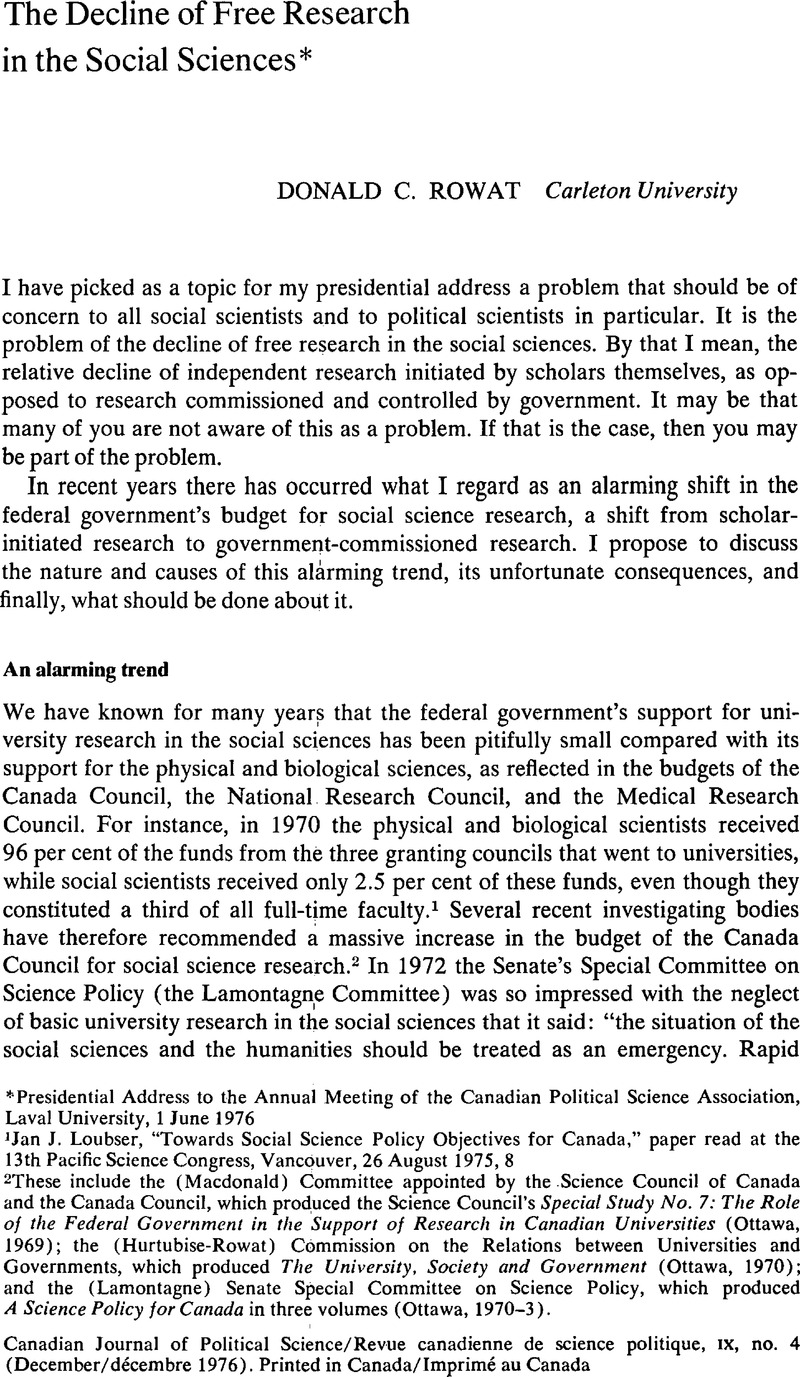Published online by Cambridge University Press: 10 November 2009

1 Loubser, Jan J., “Towards Social Science Policy Objectives for Canada,” paper read at the 13th Pacific Science Congress, Vancouver, 26 August 1975, 8Google Scholar
2 These include the (Macdonald) Committee appointed by the Science Council of Canada and the Canada Council, which produced the Science Council's Special Study No. 7: The Role of the Federal Government in the Support of Research in Canadian Universities (Ottawa, 1969)Google Scholar; the (Hurtubise-Rowat) Commission on the Relations between Universities and Governments, which produced The University, Society and Government (Ottawa, 1970)Google Scholar; and the (Lamontagne) Senate Special Committee on Science Policy, which produced A Science Policy for Canada in three volumes (Ottawa, 1970–3).Google Scholar
3 A Science Policy for Canada, vol. 2, Targets and Strategies for the Seventies (Ottawa, 1972), 461
4 These percentages were derived from tables in a recent publication of Statistics Canada, Education, Science and Culture Division, Science Statistics Section, Federal Government Activities in the Human Sciences, 1974–1976 (Ottawa, 1976), 19, 41.Google Scholar The fact that the federal government lumps the humanities in with the social sciences and then calls this category “human sciences” is an interesting commentary on its disregard of the humanities and its technocratic view of the world.
5 See stories in CAUT Bulletin (March 1976), 1–2, and University Affairs (May 1976), 1–3.
6 “The Continuing Neglect of the Social Sciences Deplored,” 4 March 1976
7 University, Society and Government, 165–8
8 Political Science in Canada: Graduate Studies and Research, a report on behalf of the Canadian Political Science Association for the Canada Council's (Healy) Commission on Graduate Studies in the Humanities and the Social Sciences (Kingston, 1975), chaps VIII and IX
9 Quoted in Meekison, J. Peter and Engelmann, F.C., “Science Policy and the CPSA,” a report to the association membership on behalf of the CPSA'S Committee on Government Science and Research (1974), 6Google Scholar
10 Jan Loubser also objects to the committee's use of this term; see “Continuing Neglect,” 14.
11 It should be noted that I am speaking only of funded research. No doubt university social scientists and humanists do a great deal of independent research and writing, in the normal course of their teaching and scholarly work, which is not funded. Because its relative significance cannot be measured in dollar terms, its importance has often been forgotten. The Bonneau-Corry Commission should be commended for recognizing its importance and applying to it the term “reflective inquiry.” See Bonneau, Louis-Philippe and Corry, J.A., Quest for the Optimum: Research Policy in the Universities of Canada, the Report of a Commission to Study the Rationalization of University Research, appointed by the AUCC (Ottawa, 1972).Google Scholar I prefer the term “critical inquiry,” as being oriented more towards writing than teaching, yet without implying expensive research techniques.
12 Targets and Strategies, 433
13 Statistics Canada, Government Activities, 40, 41. This publication reveals that thirty-one departments and agencies reported in-house research and development activities in the human sciences in 1975–6, and thirty-three reported extramural activities (p. 19). The total cost of the in-house activities was $55.4 million and of the extramural activities was $65.0 million, of which $13.5 million was in the form of contracts, $45.7 was grants, and $5.8 million was for research fellowships (p. 21). The amount going to the university sector was $22.6 million, the rest going to foreign, non-profit business, and other sectors (p. 41). Since the Canada Council spent $12.5 million on university research and development activities (p. 41), the university sector receives about half of its federal income for research and development in the human sciences from other departments and agencies. The Science Statistics Section has informed me that the amount of this in the form of contract research (rather than grants or fellowships) is $2.4 million, or about one-fifth as big as the amount going from the Canada Council to both the social sciences and the humanities for scholar-initiated research.
14 “Continuing Neglect,” 12
15 Political Science in Canada, 184
16 Ibid., 187–8
17 Ibid., 191–2
18 “Trying to Influence Policy Makers, Moral Principles vs. Social Science Research: A Personal Perspective,” paper presented at the National Social Science Conference, Human Rights and Justice Session, Ottawa, 21 November 1975, 3
19 See “Les chercheurs québecois regardent l'avenir avec une confiance prudente,” University Affairs (May 1976), 4.
20 “Continuing Neglect,” 4
21 Political Science in Canada, chaps VII and IX, and “Graduate Studies in Political Science in Canada: Their Relationship to the Development of the Discipline and the Profession,” prepared for the annual meetings of the Canadian Political Science Association, June 1976
22 Proposals such as these are made, in the Thorburn report, Political Science in Canada. The report prepared by Lemieux, Vincent on behalf of the Société canadienne de science politique for the Healy Commission, “Les études avancés de science politique dans les départements francophones” (Quebec, 1975)Google Scholar, also proposes Canada Council support for the salary and research costs of MA and PH D students who are working on an approved team project of research.
23 The 1971 Census Research Program, co-sponsored by Statistics Canada and the SSRCC, is described in the Thorburn report, Political Science in Canada, 179–80.
24 Ibid., especially his Conclusion